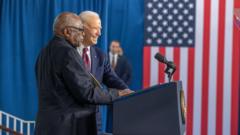In a surprising turn of events, Friedrich Merz, the leader of Germany's conservative party, fell short of the necessary votes to become chancellor, marking a significant political setback.
Friedrich Merz Falls Short in Bid for German Chancellorship

Friedrich Merz Falls Short in Bid for German Chancellorship
Conservative leader Friedrich Merz fails to secure majority support in his quest to become chancellor.
Germany's political landscape witnessed a dramatic shift as Friedrich Merz, the head of the conservative Christian Democrats, stumbled in his attempt to secure the chancellorship. In a crucial vote in the Bundestag, Germany’s 630-seat parliament, Merz garnered only 310 votes, falling short of the 316 required to form a majority. This unexpected blow comes just two and a half months after the federal elections, where his coalition was anticipated to command sufficient support.
Despite holding a coalition with the center-left, the failure appears to stem from dissent among 18 members of parliament who were expected to back him. Political analysts have labeled this an unprecedented defeat in the history of modern Germany, creating uncertainty about the chancellor's future. The Bundestag now has another 14 days to elect either Merz or a different candidate, with provisions in the constitution allowing for continued voting.
Merz’s defeat has raised eyebrows among commentators, being seen as a humiliation, particularly influenced by dissent within the Social Democrats (SPD), who had recently solidified a coalition agreement with the conservatives. The unexpected dissent highlights fractures within the SPD, adding complexity to an already tense political scenario. The historical significance of this failure cannot be understated, as no candidate has faced such an occurrence since 1949.
Adding to Merz's challenges, the far-right party Alternative for Germany—having garnered 20.8% of the vote in the February elections—has seized the opportunity to criticize the fragile coalition dynamics. Joint leader Alice Weidel stated that the vote reflects a weak coalition condemned by voters.
As the handover of governmental power remains tightly managed—illustrated by the recent Grand Tattoo ceremony honoring outgoing chancellor Olaf Scholz—Merz's aspirations of stepping into the chancellorship seem increasingly elusive. With his rival and former chancellor Angela Merkel observing, the pressure mounts on Merz to decide whether to pursue a second vote, risking further embarrassment should he fail again in his quest for the chancellorship.






















